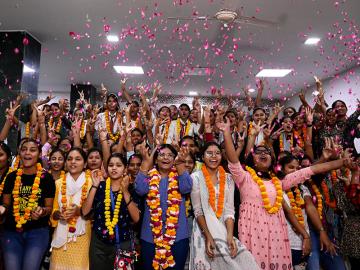The rise of remote work requires next-level intercultural skills
Leadership in a multicultural world is difficult enough, requiring unique managerial skills. Throw a global pandemic into the mix, and those skills take on even greater importance. The inability to travel or meet in person has introduced a new work culture — online culture
Remote business communications were not easily accessible before the global pandemic, and Covid-19 has exacerbated digital competency, collaboration technology, and cultural awareness concerns
Image: Shutterstock
Managers are increasingly leading teams of people – employees, clients, stakeholders – from different parts of the world. In recent years, the number of people working in culturally diverse environments has grown, globalizing companies and introducing staff to other cultures worldwide.
Leadership in a multicultural world is difficult enough, requiring unique managerial skills. Throw a global pandemic into the mix, and those skills take on even greater importance. The inability to travel or meet in person has introduced a new work culture – online culture.
Developing International Competencies
During the growth in globalization in the 1980s, businesses found that they could not simply move teams to new locations and expect them to work efficiently. Since then, organizations have realized the importance of developing the intercultural competencies of their teams. Learning to work well with people unlike us is essential in a global business world. At Thunderbird School of Global Management, a Global Mindset is a core specialty. “We teach global leadership at Thunderbird because the world needs leaders who can see past culture and politics to engage people who are wholly unlike themselves. Leaders with a Global Mindset,” said Thunderbird’s Mansour Javidan, Garvin Distinguished Professor and Director of the Najafi Global Mindset Institute. “Having the characteristics that make up Global Mindset makes it more likely that you will succeed as a global manager.”
In today’s world, two years into a global pandemic, successful business leaders need to make the most of their Global Mindset skills from a distance. They need to employ all their skills to understand cultural nuance while using digital tools.
The Difficulty of Working Remotely
According to Gartner, in March 2020, 88% of companies encouraged or required employees to work from home due to COVID-19 safety protocols. Companies like Microsoft, Spotify, Apple, Cisco, and others moved to a hybrid model within a year. These technologically savvy companies now let employees choose if they want to permanently work from their home, office, or a mix of the two. Remote business communications were not easily accessible before the global pandemic, and COVID-19 has exacerbated digital competency, collaboration technology, and cultural awareness concerns. Employees have to relearn and understand cultural norms in an online world.
Nearly 1 in 4 executives have fired an employee for slipping up during a video or audio conference. Most have levied disciplinary action for gaffes made in virtual meetings. When asked what percentage of their staff they fully trust to navigate technology needed to make remote work successful, the average response among executives was just 66%. The data suggests that executives or supervisors do not fully trust a large percentage of their employees to navigate working remotely correctly.
Developing An Intentional Approach to Remote Work
Remote-first work culture does have advantages. It transcends geographic boundaries and time zone differences and can put connection and sense of belonging of remote workers front and center. Yet it can have drawbacks.Virtual-meeting gaffes include:
- Joining a call late;
- Having spotty Internet;
- Accidentally sharing sensitive or personal information;
- Not knowing when to mute (or unmute) yourself;
And, of course, we’ve all heard about taking a meeting in the bathtub or not dressing appropriately.
When you champion and nurture a remote work culture, you don’t leave successful connections to chance. Remote-first companies are people-first companies. They enable people to bring their best selves to work regardless of their location because they foster flexible hours and asynchronous communication.
Without an intentional approach to collaboration, meetings, and expectations, people in remote and hybrid positions can feel overworked, overwhelmed, disconnected, and ineffective.
Thriving remote culture is similar to a flourishing work culture powered by a Global Mindset. True remote work culture is intentionally inclusive and creates equal opportunities for everyone. Without geographical and other barriers, people can bring their knowledge, life experiences, self-expression, unique skills, and talent to work. That’s exactly how a well-tuned Global Mindset works as well.
What Is Global Mindset?
Improving intercultural or cross-cultural skills means getting into a deliberate mindset. You display an openness or empathy toward people unlike yourself; you are enthusiastic about engaging with them; you actively seek opportunities to learn about their culture and language. In other words, someone with a Global Mindset is prepared to learn more about people from different cultures in order to build genuine relationships.Also read: Has hybridity killed teamwork?
A Global Mindset is the set of individual qualities, communication skills, and actionable knowledge that empowers those in leadership roles to influence multicultural individuals, groups, and organizations. A personality, business expertise, and knowledge are essential for success in our increasingly interconnected and competitive world.
A Global Mindset profile consists of three important dimensions that work together to create this unique mindset:
Intellectual Capital – The cognitive aspect refers to what the manager knows about global business in their industry and its broader macro environment. It also refers to how easy it is to analyze, digest and interpret this information.
Psychological Capital – The affective aspect refers to the manager’s emotional energy, capacity for self-reflection, and willingness to engage in a global environment. It reflects a positive and constructive attitude towards diversity of thought and action. It is the desire and ability to understand and embrace cultural differences.
Social Capital – The behavioral aspect reflects the manager’s ability to act in a way that helps build trusting relationships with people from other parts of the world. Whether you're heading for a leadership role in the private or public sector, understanding how social capital works in global companies, governments, and nonprofits is essential for anyone studying organizational leadership.
How Can You Develop a Global Mindset?
Like being good at a particular sport or musical instrument, some people are naturally globally-minded, and others must develop it. But either way, they each have to work hard and practice to get better. Regardless of your starting point or which category you fall into, there are ways to develop and grow your Global Mindset. Doing so will globalize your insight and decision-making, yielding long-term advantages throughout your leadership development journey.1. Self-Awareness – "Above all else, know yourself." This timeless wisdom from the ancient Greeks applies to modern international business. One of the first things you can do to develop this advantageous mindset is to become aware of your own culture and biases. Taking an honest look at our biases can be challenging, but developing awareness is the only way to work through them. Self-assurance naturally emerges out of this vital element of personal development.
2. Curiosity– To fully understand something, we must get curious. Learn about other people and different cultures. Ask a lot of questions. Travel and read about distant places when you can. Start to develop relationships with people from other countries. Master new leadership skills and business practices that will help you be more globally-minded.
3. Be Flexible and Open-Minded – Cross-cultural environments will often stretch you beyond your comfort level. You may be used to doing something one way, but your colleague from India goes about it differently. Remember that neither way is right or wrong; they're just different. Focus on being curious and try to adapt to the situation. Be open to trying new foods and activities along with trying out new methods of doing familiar things.
4. Learn a New Language – Learning a foreign language has many cognitive benefits, including increased grey-matter volume in the brain and higher neuroplasticity. It has been shown to have anti-aging effects on the brain as well. Language study also helps develop your Global Mindset by providing new cultural perspectives. Learning a new language gives your brain a boost while preparing you for international experiences.
5. Practice – Immerse yourself in multicultural environments. Practice speaking a new language with someone fluent. Try a new ritual or food from another culture. The more you practice and interact in global settings, the more your mindset will grow.
6. Never Stop Learning – Successful global leaders never stop learning. Define a strategy for yourself to learn something new every day. Maybe that means reading a book or the newspaper. Maybe it’s chatting with people from other cultures or visiting other counties. Tap into online graduate programs or executive education programs that are tailored to your schedule.
The Evolution of Remote Work
If life with COVID-19 has taught us anything, it’s that success in the 21st century depends on our ability to adapt to constant changes. Global businesses will be looking for leaders and employees with cultural flexibility, people who are successful in culturally diverse teams, and people who offer a competitive advantage to the organization.Global leaders with a solid Global Mindset will also need to adopt the skills required to manage successful remote teams. Those skills include communicating openly and often, trusting employees to be productive, staying on top of your technology infrastructure, and ensuring your team can use the tools successfully. The more you normalize this new way of working, the more successful you will be.
Leadership and management in international business come with inherent challenges and discomfort. Whether you’re an international executive or a student, developing a Global Mindset will help you thrive in global enterprises and beyond.
Check out our Festive offers upto Rs.1000/- off website prices on subscriptions + Gift card worth Rs 500/- from Eatbetterco.com. Click here to know more.
[This article has been reproduced with permission from Knowledge Network, the online thought leadership platform for Thunderbird School of Global Management https://thunderbird.asu.edu/knowledge-network/]















